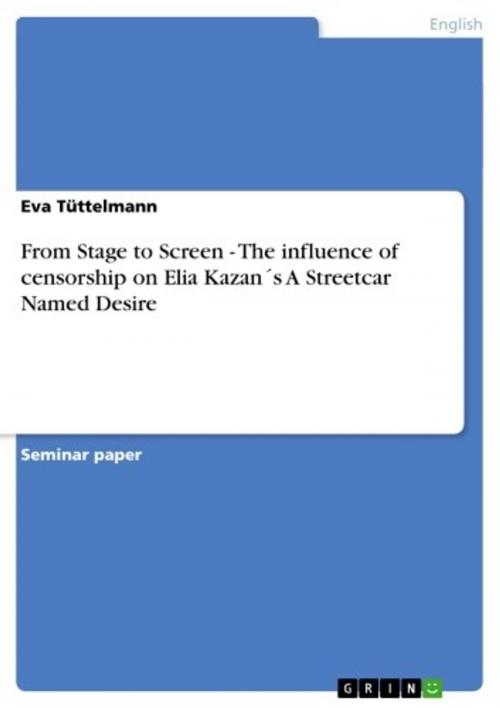From Stage to Screen - The influence of censorship on Elia Kazan´s A Streetcar Named Desire
The influence of censorship on Elia Kazan´s A Streetcar Named Desire
Fiction & Literature, Literary Theory & Criticism, British| Author: | Eva Tüttelmann | ISBN: | 9783638807999 |
| Publisher: | GRIN Publishing | Publication: | June 16, 2007 |
| Imprint: | GRIN Publishing | Language: | English |
| Author: | Eva Tüttelmann |
| ISBN: | 9783638807999 |
| Publisher: | GRIN Publishing |
| Publication: | June 16, 2007 |
| Imprint: | GRIN Publishing |
| Language: | English |
Seminar paper from the year 2006 in the subject English Language and Literature Studies - Literature, grade: 2,7, University of Cologne (Englisches Seminar), course: Nobody sees anybody truly. Selected works by Tennessee Williams, 8 entries in the bibliography, language: English, abstract: Tennesse Williams' play A Streetcar Named Desire is one of the most successful plays in the history of American drama. It was written in 1947 and first staged on December 3, 1947 at the Barrymore Theatre in New York. Blanche DuBois was played by Jessica Tandy, who had worked with Tennessee Williams before. Marlon Brando played Stanley Kowalski and Kim Hunter played Stella, his wife. The Broadway stage production was directed by Elia Kazan. As the play had been such a great success one quickly began to discuss the production of a film version. Nearly the entire Broadway cast was kept for the film, apart from Jessica Tandy, who was replaced by Vivien Leigh. Leigh seemed to promise a larger success due to her award-winning performance in Gone with the Wind about ten years earlier. She had played Blanche in Laurence Olivier's production of A Streetcar Named Desire in London. Similar to the play, the film was directed by Elia Kazan. Kazan's attempt was to stick to the play as much as possible. He and Tennessee Williams were working together closely on the development of the script. The screenplay itself was written by Oliver Saul who had to rewrite a few passages but mostly followed the dramatist's version. The plot of A Streetcar Named Desire raised the interest of industry censor Joseph Breen, who was 'the official administrator of the Code of the Motion Picture Association of America' (Phillips 1980: 81). Breen doubted the subjects discussed in A Streetcar Named Desire to be acceptable in case that they were presented in a motion picture. Although both Williams and Kazan were in opposition to the censor's demands, they were forced to find compromises as the association's influence on the audience was remarkably strong. This paper discusses the scenes that had to undergo a change as a consequence of censorship. I will compare the dramatic text and action with the film plot and try to depict the problems concerning the story, which do appear, even if Kazan and Williams did their very best to avoid this. I will illustrate how Kazan used subtle images and hints in attempt to transport the message he had been forbidden to transport. The ending of the film is of special interest and will be dealt with more explicitly as it changes not only the plot but also special features of the characters. Small modifications through which only little is lost in translation will not be discussed.
Seminar paper from the year 2006 in the subject English Language and Literature Studies - Literature, grade: 2,7, University of Cologne (Englisches Seminar), course: Nobody sees anybody truly. Selected works by Tennessee Williams, 8 entries in the bibliography, language: English, abstract: Tennesse Williams' play A Streetcar Named Desire is one of the most successful plays in the history of American drama. It was written in 1947 and first staged on December 3, 1947 at the Barrymore Theatre in New York. Blanche DuBois was played by Jessica Tandy, who had worked with Tennessee Williams before. Marlon Brando played Stanley Kowalski and Kim Hunter played Stella, his wife. The Broadway stage production was directed by Elia Kazan. As the play had been such a great success one quickly began to discuss the production of a film version. Nearly the entire Broadway cast was kept for the film, apart from Jessica Tandy, who was replaced by Vivien Leigh. Leigh seemed to promise a larger success due to her award-winning performance in Gone with the Wind about ten years earlier. She had played Blanche in Laurence Olivier's production of A Streetcar Named Desire in London. Similar to the play, the film was directed by Elia Kazan. Kazan's attempt was to stick to the play as much as possible. He and Tennessee Williams were working together closely on the development of the script. The screenplay itself was written by Oliver Saul who had to rewrite a few passages but mostly followed the dramatist's version. The plot of A Streetcar Named Desire raised the interest of industry censor Joseph Breen, who was 'the official administrator of the Code of the Motion Picture Association of America' (Phillips 1980: 81). Breen doubted the subjects discussed in A Streetcar Named Desire to be acceptable in case that they were presented in a motion picture. Although both Williams and Kazan were in opposition to the censor's demands, they were forced to find compromises as the association's influence on the audience was remarkably strong. This paper discusses the scenes that had to undergo a change as a consequence of censorship. I will compare the dramatic text and action with the film plot and try to depict the problems concerning the story, which do appear, even if Kazan and Williams did their very best to avoid this. I will illustrate how Kazan used subtle images and hints in attempt to transport the message he had been forbidden to transport. The ending of the film is of special interest and will be dealt with more explicitly as it changes not only the plot but also special features of the characters. Small modifications through which only little is lost in translation will not be discussed.















